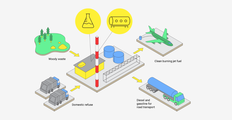- The plant will process over half a million tonnes of non-recyclable waste annually.
- The technology enables a 70% reduction in greenhouse gas emissions per tonne of sustainable jet fuel.
- The project is expected to bring hundreds of millions of pounds in investment and create approximately 130 permanent jobs.
- The fuel will reduce particulate matter by up to 90% and almost eliminate sulphur oxides.

Project Overview
Altalto Immingham Limited, a subsidiary of Velocys, in collaboration with British Airways and Shell, has submitted a planning application to develop Europe’s first commercial-scale household and commercial solid waste to sustainable fuels plant in North East Lincolnshire. The plant, located near Immingham close to the Humber Estuary, will process over half a million tonnes of non-recyclable waste annually, converting it into sustainable aviation and road fuel.
Environmental Impact
The technology integrated by Velocys will enable a net 70% reduction in greenhouse gas emissions for each tonne of sustainable jet fuel produced, compared to conventional fuel. The annual output of the plant is expected to achieve greenhouse gas reductions equivalent to removing up to 40,000 standard petrol engine cars from the road. Additionally, the fuel will improve air quality by reducing particulate matter (soot) from aircraft engine exhausts by up to 90% and almost completely eliminating sulphur oxides.
Economic Benefits
The development is anticipated to bring significant economic benefits to the region, including hundreds of millions of pounds in investment and the creation of hundreds of jobs during the construction phase. Once operational, the plant will provide approximately 130 permanent jobs. Domestically producing the fuel will also enhance the UK’s fuel supply resilience, as the country currently imports more than 70% of its jet fuel.
Future Prospects
The project represents a significant step towards reducing carbon emissions in the aviation sector and meeting industry targets for carbon-neutral growth from 2020 and a 50% reduction in CO2 emissions by 2050 from 2005 levels. The initiative also aligns with broader goals of achieving a net-zero carbon world by the middle of the century.

